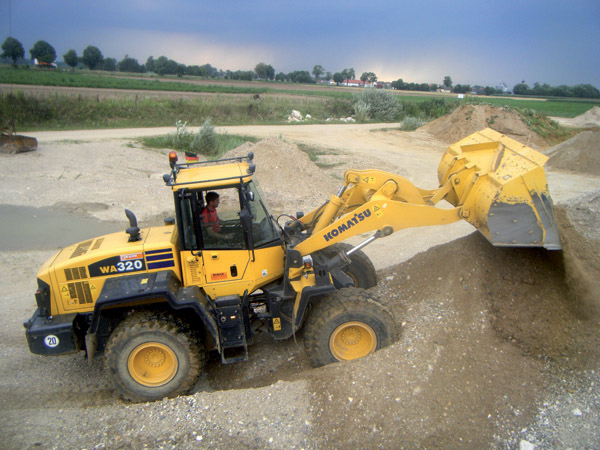
While today's super-quarries maybe grabbing the headlines, micro-quarries can still be profitable operations. Mike Woof visited one in Germany to find out more
Close to the village of Pfatter, around 23km from the city of Regensburg, in the southern German state of Bavaria is the small Scheck sand and gravel quarry. This operation is typical of the many such quarries lying along the banks of the Danube River. These quarries range from the very small, to mid-sized operations and the area is well known for the quality of its sand and gravel.
Regensburg is where the Danube River is at its northernmost point and before it makes the long journey south through Austria, Hungary and Bulgaria. Over millions of years the Danube River has shifted its course numerous times and deposited layers of sand and gravel on the flat land along its banks.
The Pfatter quarry is an offshoot of the Scheck company, which specialises in truck transport and has a fleet of around 100 or so vehicles. Scheck is a family run company owned by Christian Scheck, while the sand and gravel quarry is run by his in-laws, the Schwimmbecks.
This quarry lies at the very opposite end of the production spectrum from large operations run around the clock and through the week. The quarry, which covers just 2.7ha and exploits a deposit that is around 5m deep, is operated on a part time basis. Sepp Schwimmbeck (junior) has a full time job and works in the quarry in the evenings or at weekends. His father, Sepp Schwimmbeck senior is semi-retired and works in the quarry during the day, as required by demand for their product.
Despite its small size, the operation is likely to have a 10 year life due to its low-key production cycle. The product is sold mainly to the local construction market for use in housebuilding, sub-base or concrete.
Schwimmbeck (junior) said that the
The quarry also has a Menck dragline, which is used to dredge material from the water and is nearly 50 years old. The dragline is definitely a product of its time as it lacks the operator comforts of newer machines, although it has been fitted with a heater for use in cold weather. However Schwimmbeck (junior) said that the dragline still fires up without any difficulty (it does need a freshly charged battery in cold weather) and despite its age, is still a useful site tool.
The age of the unit does present challenges and although he can carry out simple tasks, he is not able to use it for the more complex digging tasks, which are carried out as required by an older operator from the nearby village. Schwimmbeck (senior) explained, "It is an old machine and all the people who can drive these properly are in their 70s." Screening is carried out as required, using a rented plant and usually on a monthly basis. Schwimmbeck (junior) explained that when the different stockpiles of the different material sizes become depleted, the plant is rented in.
The small scale of the site has minimal environmental impact so can operate without the need for any strict controls on noise or dust on the part of the company. Looking ahead, the environmental remediation required will also be minimal. The worked out site will become another of the ponds dotted around the area, many of which are used to irrigate the surrounding farmland or are stocked with fish.
As a small family run business, the Scheck operation is able to supply stone in quantities that would be unprofitably small for larger quarries. And it is worth remembering that such micro operations supply a need on a local basis that larger quarries are unable to fill.













